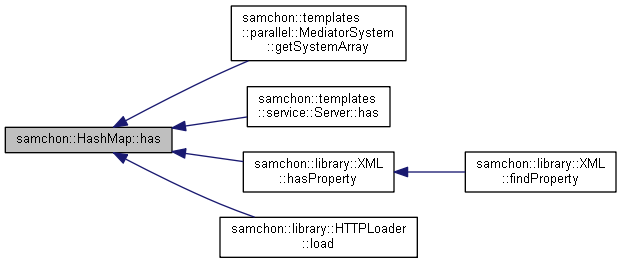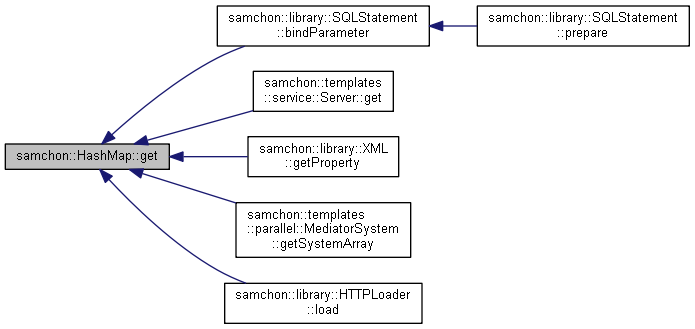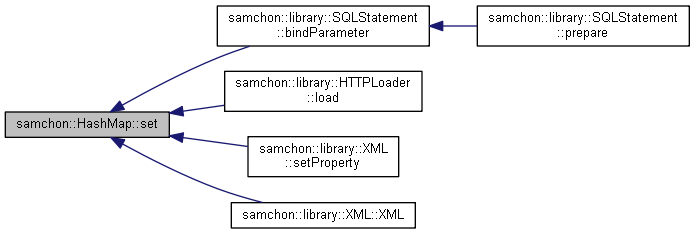|
Samchon Framework for CPP
1.0.0
|
|
Samchon Framework for CPP
1.0.0
|
Customized std::unordered_map. More...
#include <HashMap.hpp>
Public Member Functions | |
| auto | has (const Key &key) const -> bool |
| Whether have the item or not. More... | |
| auto | get (const Key &key) -> T & |
| Get element. More... | |
| void | set (const Key &key, const T &val) |
| Set element. More... | |
| auto | pop (const Key &key) -> T |
| Pop item. More... | |
Customized std::unordered_map.
HashMap is a std::unordered_map some methods are modified.
Unordered maps are associative containers that store elements formed by the combination of a key value and a mapped value, and which allows for fast retrieval of individual elements based on their keys.
In an unordered_map, the key value is generally used to uniquely identify the element, while the mapped value is an object with the content associated to this key. Types of key and mapped value may differ.
Internally, the elements in the unordered_map are not sorted in any particular order with respect to either their key or mapped values, but organized into buckets depending on their hash values to allow for fast access to individual elements directly by their key values (with a constant average time complexity on average).
unordered_map containers are faster than map containers to access individual elements by their key, although they are generally less efficient for range iteration through a subset of their elements.
Unordered maps implement the direct access operator (operator[]) which allows for direct access of the mapped value using its key value as argument.
In the reference for the unordered_map member functions, these same names (Key, T, Hash, Pred and Alloc) are assumed for the template parameters.
Iterators to elements of unordered_map containers access to both the key and the mapped value. For this, the class defines what is called its value_type, which is a pair class with its first value corresponding to the const version of the key type (template parameter Key) and its second value corresponding to the mapped value (template parameter T):
Iterators of a unordered_map container point to elements of this value_type. Thus, for an iterator called it that points to an element of a map, its key and mapped value can be accessed respectively with:
Naturally, any other direct access operator, such as -> or [] can be used, for example:
| Key | Type of the key values. Each element in an unordered_map is uniquely identified by its key value. Aliased as member type unordered_map::key_type. |
| T | Type of the mapped value. Each element in an unordered_map is used to store some data as its mapped value. Aliased as member type unordered_map::mapped_type. Note that this is not the same as unordered_map::value_type. |
| Hash | A unary function object type that takes an object of type key type as argument and returns a unique value of type size_t based on it. This can either be a class implementing a function call operator or a pointer to a function (see constructor for an example). This defaults to hash<Key>, which returns a hash value with a probability of collision approaching 1.0/std::numeric_limits<size_t>::max(). The unordered_map object uses the hash values returned by this function to organize its elements internally, speeding up the process of locating individual elements. Aliased as member type unordered_map::hasher. |
| Alloc | Type of the allocator object used to define the storage allocation model. By default, the allocator class template is used, which defines the simplest memory allocation model and is value-independent. Aliased as member type unordered_map::allocator_type. |
Definition at line 103 of file HashMap.hpp.
|
inline |
Whether have the item or not.
Indicates whether a map has an item having the specified identifier.
| key | Key value of the element whose mapped value is accessed. |
Definition at line 125 of file HashMap.hpp.
Referenced by samchon::templates::parallel::MediatorSystem::getSystemArray(), samchon::templates::service::Server::has(), samchon::library::XML::hasProperty(), and samchon::library::HTTPLoader::load().

|
inline |
Get element.
Returns a reference to the mapped value of the element identified with key
| key | Key value of the element whose mapped value is accessed. |
| exception | out of range |
Definition at line 144 of file HashMap.hpp.
Referenced by samchon::library::SQLStatement::bindParameter(), samchon::templates::service::Server::get(), samchon::library::XML::getProperty(), samchon::templates::parallel::MediatorSystem::getSystemArray(), and samchon::library::HTTPLoader::load().

|
inline |
Set element.
Set an item as the specified identifier.
If the identifier is already in map, change value of the identifier.
If not, then insert the object with the identifier.
| key | Key value of the element whose mapped value is accessed. |
| val | Value, the item. |
Definition at line 165 of file HashMap.hpp.
Referenced by samchon::library::SQLStatement::bindParameter(), samchon::library::HTTPLoader::load(), samchon::library::XML::setProperty(), and samchon::library::XML::XML().

|
inline |
Pop item.
Removes an item having specified key and returns the removed element.
Definition at line 188 of file HashMap.hpp.